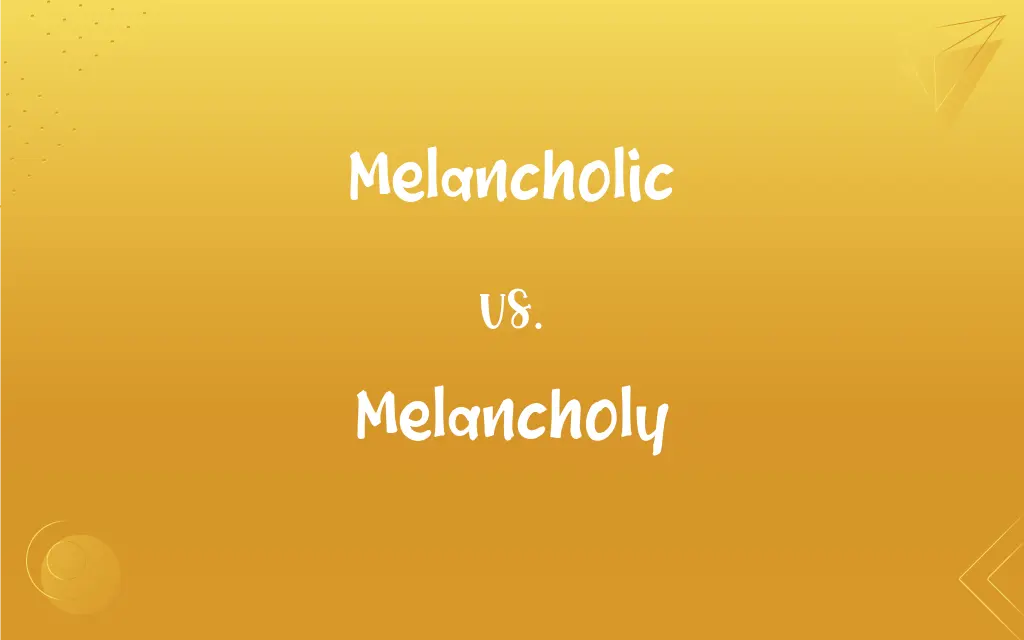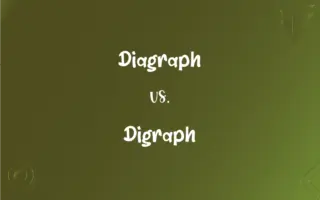Melancholic vs. Melancholy: What's the Difference?
By Harlon Moss & Janet White || Updated on May 20, 2024
Melancholic describes a person or mood characterized by deep sadness, while melancholy refers to a profound, often pensive, sadness or the state of being sad.

Key Differences
Melancholic is an adjective that describes someone who is habitually sad or has a gloomy temperament. It emphasizes the nature of a person's emotional state. For example, a melancholic individual often appears sorrowful and introspective, consistently exhibiting a downcast demeanor. Melancholy, on the other hand, can be used as both a noun and an adjective. As a noun, it refers to a deep, enduring sadness or depression. When used as an adjective, it describes things that evoke or pertain to this type of sadness. For instance, a melody can be described as melancholy if it evokes feelings of sorrow.
Melancholic often pertains to a personality type or long-term mood. It suggests a consistent and defining feature of someone's character. For example, a writer with a melancholic disposition might consistently produce reflective and somber work. Whereas melancholy, especially as a noun, can be a temporary state or feeling. Someone might experience melancholy during a rainy day or after a poignant event, but this feeling might not define their overall temperament. It is more about the moment than a permanent characteristic.
Melancholic individuals are often seen as deep thinkers, prone to introspection and philosophical musings. Their sadness is typically more chronic and integral to their identity. This consistent melancholic state influences their outlook on life and interactions with others. In contrast, melancholy as a mood or state can be triggered by specific events or memories. It doesn't necessarily indicate a person's overall disposition but rather a reaction to particular circumstances. For instance, looking through old photographs might induce a temporary state of melancholy.
Comparison Chart
Part of Speech
Adjective
Noun and Adjective
Usage
Describes a person's temperament or mood
Refers to a state of deep sadness
ADVERTISEMENT
Duration
Often long-term or chronic
Can be temporary or situational
Example Context
A melancholic artist
A melody filled with melancholy
Emotional Depth
Deep, introspective sadness
Profound but can be transient sadness
Melancholic and Melancholy Definitions
Melancholic
Having a tendency to be sad.
She had a melancholic expression throughout the day.
Melancholy
A profound sadness.
He fell into a melancholy after the loss of his friend.
ADVERTISEMENT
Melancholic
Pertaining to melancholia.
The painting captures a melancholic mood.
Melancholy
A reflective sadness.
The melancholy of autumn always affected her deeply.
Melancholic
Deeply thoughtful and reflective.
His melancholic nature made him a great philosopher.
Melancholy
A pensive state.
Walking through the empty streets filled him with melancholy.
Melancholic
Gloomy or pensive.
The melancholic atmosphere of the old house was unsettling.
Melancholy
Sadness or depression of the spirits; gloom.
Melancholic
Affected with or subject to melancholy.
Melancholy
Pensive reflection or contemplation.
Melancholic
Of or relating to melancholia.
Melancholy
Black bile.
Melancholic
Filled with or affected by melancholy—great sadness or depression, especially of a thoughtful or introspective nature.
Melancholy
An emotional state characterized by sullenness and outbreaks of violent anger, believed to arise from an excess of black bile.
Melancholic
(dated) Pertaining to black bile (melancholy).
Melancholy
Feeling, showing, or expressing depression of the spirits; sad or dejected.
Melancholic
(classical temperament) Pertaining to the melancholic temperament or its associated personality traits.
Melancholy
Causing or tending to cause sadness or gloom
A letter with some melancholy news.
Melancholic
A person who is habitually melancholy.
Melancholy
Pensive; thoughtful.
Melancholic
Given to melancholy; depressed; melancholy; dejected; unhappy.
Just as the melancholic eyeSees fleets and armies in the sky.
Melancholy
(historical) Black bile, formerly thought to be one of the four "cardinal humours" of animal bodies.
Melancholic
One affected with a gloomy state of mind.
Melancholy
Great sadness or depression, especially of a thoughtful or introspective nature.
Melancholic
A gloomy state of mind; melancholy.
Melancholy
(literary) Affected with great sadness or depression.
Melancholy people don't talk much.
Melancholic
Someone subject to melancholia
Melancholy
Depression of spirits; a gloomy state continuing a considerable time; deep dejection; gloominess.
Melancholic
Characterized by or causing or expressing sadness;
Growing more melancholy every hour
Her melancholic smile
We acquainted him with the melancholy truth
Melancholy
Great and continued depression of spirits, amounting to mental unsoundness; melancholia.
Melancholic
Characterized by a habitual sadness.
The melancholic tone of his letters was evident.
Melancholy
Pensive maditation; serious thoughtfulness.
Melancholy
Ill nature.
Melancholy
Depressed in spirits; dejected; gloomy dismal.
Melancholy
Producing great evil and grief; causing dejection; calamitous; afflictive; as, a melancholy event.
Melancholy
Somewhat deranged in mind; having the jugment impaired.
Melancholy
Favorable to meditation; somber.
A pretty, melancholy seat, well wooded and watered.
Melancholy
A feeling of thoughtful sadness
Melancholy
A constitutional tendency to be gloomy and depressed
Melancholy
A humor that was once believed to be secreted by the kidneys or spleen and to cause sadness and melancholy
Melancholy
Characterized by or causing or expressing sadness;
Growing more melancholy every hour
Her melancholic smile
We acquainted him with the melancholy truth
Melancholy
Something that induces sadness.
The melancholy music made everyone reflective.
Melancholy
A somber mood.
She enjoyed the quiet melancholy of a rainy day.
FAQs
Can melancholic describe music?
Yes, melancholic can describe music that evokes sadness.
What is melancholy as a noun?
Melancholy as a noun refers to a deep, enduring sadness.
Is melancholy a permanent state?
No, melancholy can be a temporary feeling or mood.
How do you use melancholic in a sentence?
e.g., The poet's melancholic verses touched everyone.
Does melancholic only describe people?
No, melancholic can describe moods, atmospheres, and more.
What does melancholic mean?
Melancholic means having a tendency to be sad or gloomy.
What part of speech is melancholic?
Melancholic is an adjective.
Does melancholic have a synonym?
Yes, synonyms include despondent and gloomy.
Can a person be described as melancholy?
Yes, a person can be described as feeling melancholy.
Can melancholy describe weather?
Yes, weather can be described as melancholy if it evokes sadness.
Is melancholic a medical term?
It can be used in medical contexts to describe a depressive temperament.
How is melancholy used as an adjective?
As an adjective, melancholy describes something that induces sadness.
What part of speech is melancholy?
Melancholy can be a noun or an adjective.
Is there a difference in severity between melancholic and melancholy?
Melancholic often implies a more chronic state, whereas melancholy can be transient.
Can melancholic describe a piece of art?
Yes, art can be described as melancholic if it evokes sadness.
Can melancholy be positive?
It can have a reflective, nostalgic quality that some might find positive.
Is melancholic related to melancholia?
Yes, melancholic describes characteristics related to melancholia.
Is melancholic used in psychology?
Yes, it can describe a depressive temperament in psychological contexts.
Is melancholy a common term?
It's less common in everyday language but still widely understood.
Can melancholy be used in poetry?
Yes, it's often used to evoke deep emotional states in poetry.
About Author
Written by
Harlon MossHarlon is a seasoned quality moderator and accomplished content writer for Difference Wiki. An alumnus of the prestigious University of California, he earned his degree in Computer Science. Leveraging his academic background, Harlon brings a meticulous and informed perspective to his work, ensuring content accuracy and excellence.
Co-written by
Janet WhiteJanet White has been an esteemed writer and blogger for Difference Wiki. Holding a Master's degree in Science and Medical Journalism from the prestigious Boston University, she has consistently demonstrated her expertise and passion for her field. When she's not immersed in her work, Janet relishes her time exercising, delving into a good book, and cherishing moments with friends and family.































































